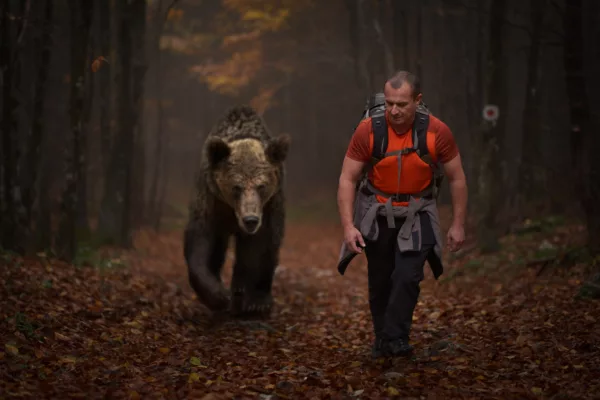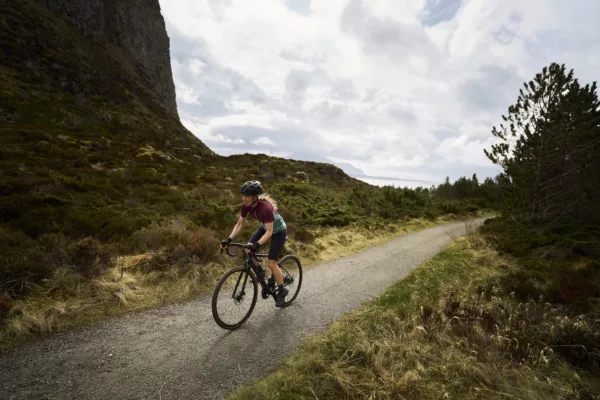Angus Adventures: Clandestine Camping

When it comes to pitching a tent, Colin Angus asks — is it better to ask permission or beg forgiveness?
Let’s Face it, pitching a tent and hanging around the campfire makes for some of the most memorable outdoor experiences. Sure, when we’re tight on time, a quick day-trip to our favourite wall, river or surf break will suffice, but there’s nothing that better appeals to our closeted paleo man or woman than a few days fully immersed in the green stuff.
The problem, though, is: while camping may liberate our soul, it can also be restrictive. We’re often confined to designated sites, which may be miles from the action or scenery. Rowdy neighbours or the rumble of traffic can quickly transform the Zen-like tranquility of a night under the stars into a bleary headache we’d rather forget. If only we could set our tents up anywhere we liked — next to that pristine waterfall or gorgeous beach. But we can’t. Or can we?
By virtue of necessity, my wife, Julie, and I have been learning the answer to this question over the years as we’ve travelled the world by human power. We’ve trekked, paddled and cycled through lands ranging from the most remote to the most populated regions on the planet. And at the end of each day, the luxury of a campground seldom exists. This means we have no choice but to tentatively tent on whatever private or public land we come across.
Official policy regarding wild camping varies around the world. For the most part tenting on private land requires permission from the owner, while public land is subject to a mixed bag of rules depending on the country, ruling jurisdiction and a plethora of other variables. Norway offers the most progressive and consistent rules for backwoods/urban camping where the “right to access” law allows you to camp on private or public land as long as it is not closer than 150 metres to any buildings and not interfering with cultivated land. However, usually when we are ready to put up our dogs we’re not in Knut Hamsun’s homeland, which means camping may not be welcome.
In reality, it has been impossible for us to abide entirely by the rules; landowners are notoriously hard to track down to ask for permission and the rules for camping on crown land vary from one town to the next. Instead, we’ve adopted the philosophy of respecting the land, and asking for forgiveness when confronted.
And this strategy has worked. We’ve now free-camped in more than 1,100 locations in 36 different countries, and, incredibly, have never been asked to move once. Our most common camping spots are in forests and farmers’ fields, but we’ve also had our fair share of peculiar and spectacular locations. We’ve camped on the banks of the Thames River, a stone’s throw from Windsor Castle, pitched our tent inside a restaurant in Nicaragua and even camped in the heart of one of the world’s most bustling cities — on a rowing dock in the heart of London’s pub district.
Perhaps the most nerve-wracking camping experience was waking up to learn we’d pitched our tent in a military firing and bombing range in the south of England. Fortunately, officials noticed us and kindly asked their men to hold off target practice until we’d finished breakfast and broken camp. In Siberia, I camped in the ruins of a decayed Gulag prisoner camp, and in Ukraine an overgrown cemetery provided the only peaceful spot to catch up on our shut-eye.
We’ve developed a set of rules to increase the chances of success with stealth camping. First, make sure your camping site is relatively hidden. If you’re not noticed, you won’t get kicked out. Secondly, make sure to respect the land; don’t leave trash, don’t burn fires, don’t disturb crops and close gates behind you. Proper stewardship will reduce the chance of future campers being evicted. And importantly, be friendly and cheery to anybody questioning your choice of camping spot.
With the right attitude and strategy, clandestine camping literally turns the entire world into your backyard. Million dollar views, close wildlife encounters and convenient locations are yours to experience. Just remember, though, when you wake up to find the cows eating the last of your granola, don’t be upset; it’s their land, not yours.














